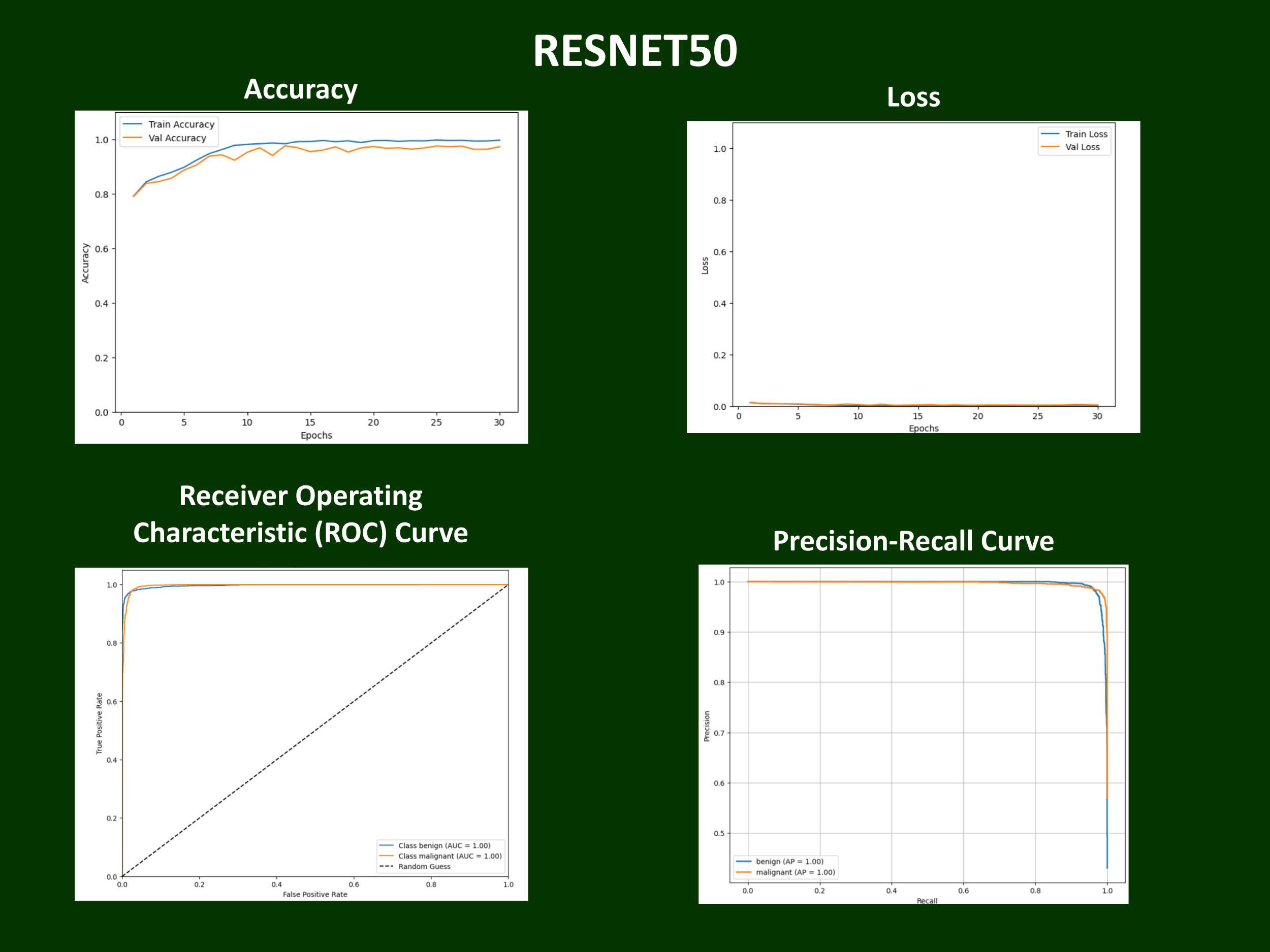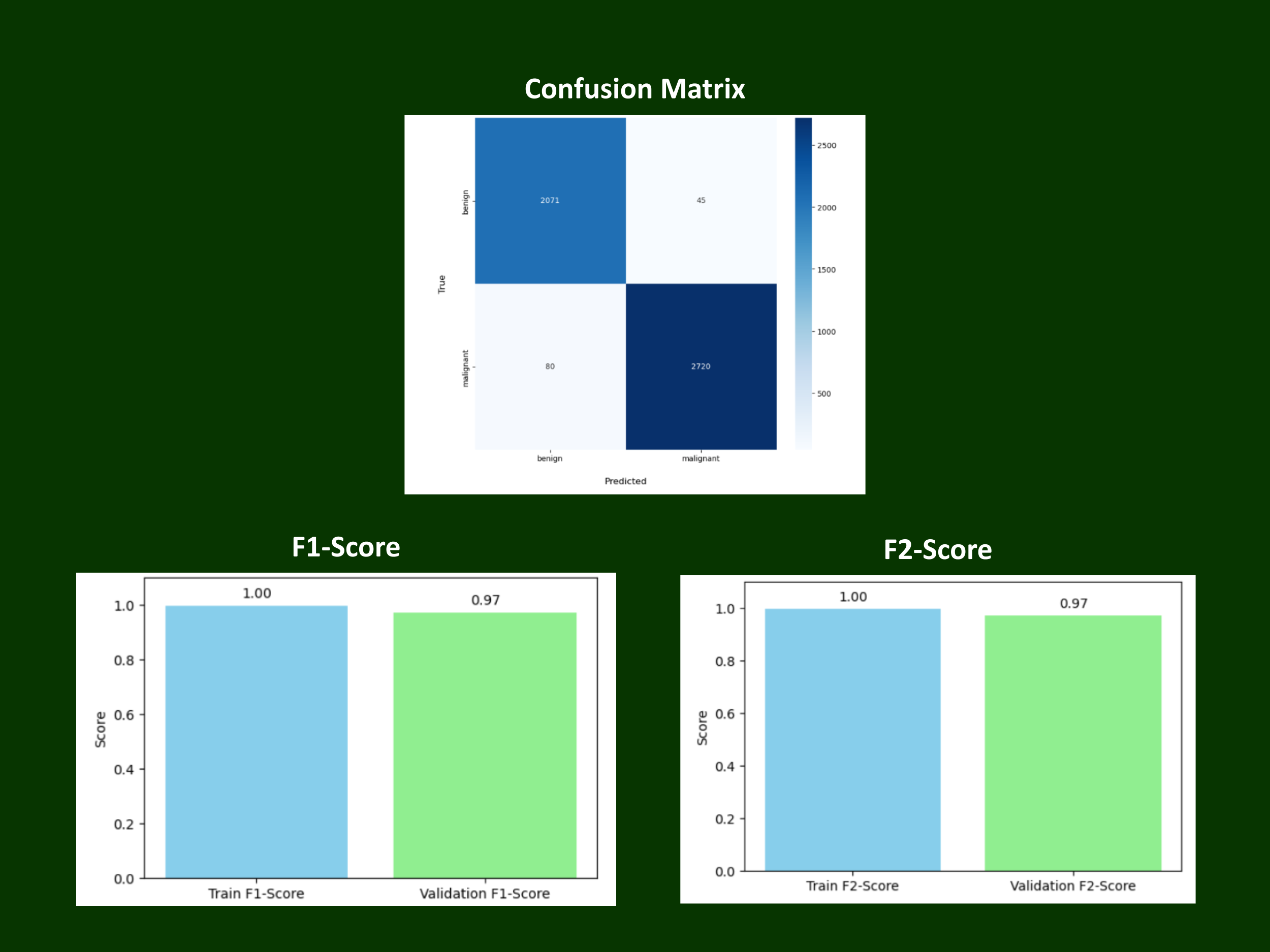Sunday Poster Session
Category: Colon
P0255 - High-Fidelity Detection of Colorectal Cancer From Histopathological Images Using Artificial Intelligence
Sunday, October 26, 2025
3:30 PM - 7:00 PM PDT
Location: Exhibit Hall
- TP
Tirth Patel, MBBS
GMERS Medical College and Hospital, Himmatnagar
Himmatnagar, Gujarat, India
Presenting Author(s)
Award: ACG Presidential Poster Award
Tirth Patel, MBBS1, Ramya Elangovan, 2, Jansi Sethuraj, BSN, RN, CCRN3, Kavin Elangovan, 2, Alison Seales, BS4, Annie Ajang, BS4, Shannon Anglin, BS4, Elangovan Krishnan, MBBS, PhD, MS5
1GMERS Medical College and Hospital, Himmatnagar, Himmatnagar, Gujarat, India; 2AIM DOCTOR, Houston, TX; 3University of Texas Health Science Center, Houston, TX; 4St. George's University School of Medicine, Phoenix, AZ; 5AIM DOCTOR, Chennai, Tamil Nadu, India
Introduction: Colorectal cancer is the third most common cancer globally and a leading cause of cancer mortality, with nearly 2 million new cases and 1 million deaths annually. Despite advances in screening, diagnostic delays persist due to non-specific symptoms, interobserver variability in pathology, and resource limitations. Deep learning models, particularly the ResNet50 architecture, have emerged as a transformative tool in medical imaging. By leveraging residual connections across 50 layers, ResNet50 enables robust extraction of complex histopathological features, enhancing accuracy and generalizability in cancer detection.
Methods: A large, anonymized dataset comprising 10,000 histopathological colon tissue images, malignant and benign, was randomly assigned into training (60%), validation (20%), and testing (20%) cohorts. Images underwent comprehensive preprocessing and augmentation to maximize model robustness. The ResNet50 architecture was trained and optimized, with diagnostic performance assessed using accuracy, precision-recall, F1-score, F2-score, and area under the receiver operating characteristic curve (AUROC) on validation and test sets. The output model was deployed in a universally accessible, cross-platform application for real-time expert validation and diagnostic support.
Results: ResNet50 achieved outstanding diagnostic performance in classifying colorectal tissue. The confusion matrix revealed 2,071/2,116 benign and 2,720/2,800 malignant samples correctly identified, with only 45 benign and 80 malignant misclassified. Validation F1-score and F2-score reached 0.97, while training scores were 1.00. Accuracy reached 97% and loss converged toward zero as the number of training epochs increased. Both AUROC and precision-recall curves demonstrated values of 1.00 for benign and malignant classes, underscoring the model’s exceptional discriminative power.
Discussion: ResNet50’s high accuracy and reliability illustrate the paradigm shift deep learning brings to colorectal cancer diagnostics. By automating nuanced feature extraction, ResNet50 reduces diagnostic subjectivity and expedites clinical workflows. Universal deployment democratizes access to advanced diagnostics, supporting clinicians in diverse settings and potentially improving outcomes through earlier, more accurate detection of colorectal malignancies.

Figure: Diagnostic Performance of ResNet50 -1

Figure: Diagnostic Performance of ResNet50 -2
Disclosures:
Tirth Patel indicated no relevant financial relationships.
Ramya Elangovan indicated no relevant financial relationships.
Jansi Sethuraj indicated no relevant financial relationships.
Kavin Elangovan indicated no relevant financial relationships.
Alison Seales indicated no relevant financial relationships.
Annie Ajang indicated no relevant financial relationships.
Shannon Anglin indicated no relevant financial relationships.
Elangovan Krishnan indicated no relevant financial relationships.
Tirth Patel, MBBS1, Ramya Elangovan, 2, Jansi Sethuraj, BSN, RN, CCRN3, Kavin Elangovan, 2, Alison Seales, BS4, Annie Ajang, BS4, Shannon Anglin, BS4, Elangovan Krishnan, MBBS, PhD, MS5. P0255 - High-Fidelity Detection of Colorectal Cancer From Histopathological Images Using Artificial Intelligence, ACG 2025 Annual Scientific Meeting Abstracts. Phoenix, AZ: American College of Gastroenterology.
Tirth Patel, MBBS1, Ramya Elangovan, 2, Jansi Sethuraj, BSN, RN, CCRN3, Kavin Elangovan, 2, Alison Seales, BS4, Annie Ajang, BS4, Shannon Anglin, BS4, Elangovan Krishnan, MBBS, PhD, MS5
1GMERS Medical College and Hospital, Himmatnagar, Himmatnagar, Gujarat, India; 2AIM DOCTOR, Houston, TX; 3University of Texas Health Science Center, Houston, TX; 4St. George's University School of Medicine, Phoenix, AZ; 5AIM DOCTOR, Chennai, Tamil Nadu, India
Introduction: Colorectal cancer is the third most common cancer globally and a leading cause of cancer mortality, with nearly 2 million new cases and 1 million deaths annually. Despite advances in screening, diagnostic delays persist due to non-specific symptoms, interobserver variability in pathology, and resource limitations. Deep learning models, particularly the ResNet50 architecture, have emerged as a transformative tool in medical imaging. By leveraging residual connections across 50 layers, ResNet50 enables robust extraction of complex histopathological features, enhancing accuracy and generalizability in cancer detection.
Methods: A large, anonymized dataset comprising 10,000 histopathological colon tissue images, malignant and benign, was randomly assigned into training (60%), validation (20%), and testing (20%) cohorts. Images underwent comprehensive preprocessing and augmentation to maximize model robustness. The ResNet50 architecture was trained and optimized, with diagnostic performance assessed using accuracy, precision-recall, F1-score, F2-score, and area under the receiver operating characteristic curve (AUROC) on validation and test sets. The output model was deployed in a universally accessible, cross-platform application for real-time expert validation and diagnostic support.
Results: ResNet50 achieved outstanding diagnostic performance in classifying colorectal tissue. The confusion matrix revealed 2,071/2,116 benign and 2,720/2,800 malignant samples correctly identified, with only 45 benign and 80 malignant misclassified. Validation F1-score and F2-score reached 0.97, while training scores were 1.00. Accuracy reached 97% and loss converged toward zero as the number of training epochs increased. Both AUROC and precision-recall curves demonstrated values of 1.00 for benign and malignant classes, underscoring the model’s exceptional discriminative power.
Discussion: ResNet50’s high accuracy and reliability illustrate the paradigm shift deep learning brings to colorectal cancer diagnostics. By automating nuanced feature extraction, ResNet50 reduces diagnostic subjectivity and expedites clinical workflows. Universal deployment democratizes access to advanced diagnostics, supporting clinicians in diverse settings and potentially improving outcomes through earlier, more accurate detection of colorectal malignancies.

Figure: Diagnostic Performance of ResNet50 -1

Figure: Diagnostic Performance of ResNet50 -2
Disclosures:
Tirth Patel indicated no relevant financial relationships.
Ramya Elangovan indicated no relevant financial relationships.
Jansi Sethuraj indicated no relevant financial relationships.
Kavin Elangovan indicated no relevant financial relationships.
Alison Seales indicated no relevant financial relationships.
Annie Ajang indicated no relevant financial relationships.
Shannon Anglin indicated no relevant financial relationships.
Elangovan Krishnan indicated no relevant financial relationships.
Tirth Patel, MBBS1, Ramya Elangovan, 2, Jansi Sethuraj, BSN, RN, CCRN3, Kavin Elangovan, 2, Alison Seales, BS4, Annie Ajang, BS4, Shannon Anglin, BS4, Elangovan Krishnan, MBBS, PhD, MS5. P0255 - High-Fidelity Detection of Colorectal Cancer From Histopathological Images Using Artificial Intelligence, ACG 2025 Annual Scientific Meeting Abstracts. Phoenix, AZ: American College of Gastroenterology.

